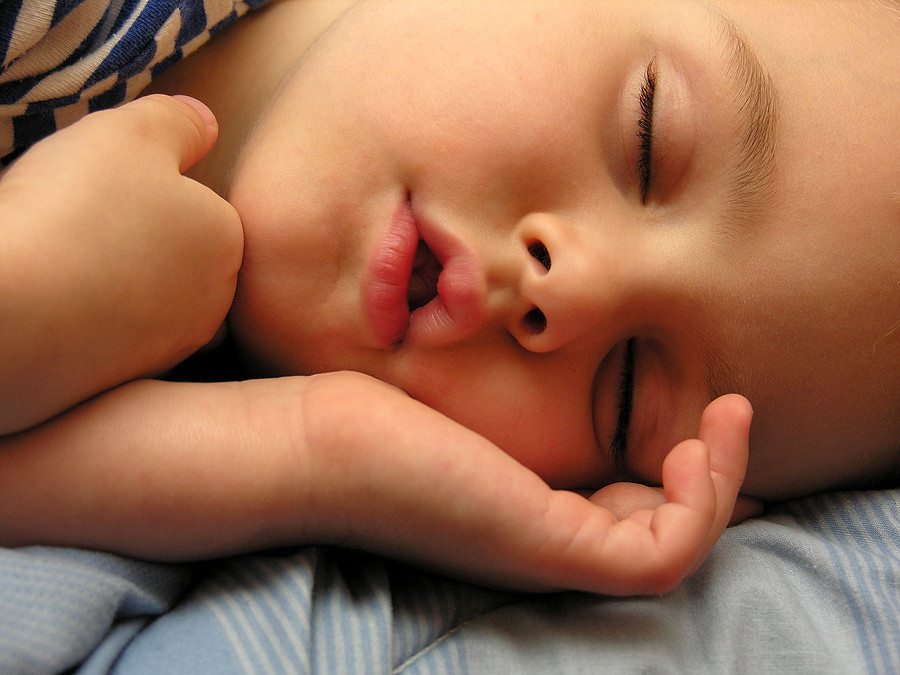Snoring in kids linked to behavioral problems

Not all kids match the misty-eyed view of a child asleep—quiet, peaceful, covers snugged up under the chin and a stuffed animal tucked under the arm. For some children, sleep is anything but peaceful. They snore, or sometimes stop breathing for a few seconds then recover with a gasp. According to a new study in the journal Pediatrics, sleep-related breathing problems like these may increase the chances a child will become hyperactive, overly aggressive, anxious, or depressed.
In adults, sleep-related breathing problems have been linked to daytime sleepiness, accidents, and the development of high blood pressure, heart disease, diabetes, and other chronic disorders. The effects of sleep-related breathing problems on children are less well understood.
Researchers from Albert Einstein College of Medicine in New York followed the health and development of more than 11,000 children born in southwest England between April 1991 and December 1992. Their parents periodically answered questionnaires about health and behavior.
In the study, about half of the children were identified as having trouble breathing during sleep. Other studies, though, put the number much lower, between 5% and 10%.
Children in the study who had trouble breathing during sleep from 6 months of age onward were more likely to have developed behavioral or emotional problems by age 7 than those who breathed normally as they slept.
“Trouble breathing” included mouth breathing, snoring, and apnea. Apnea is the medical term for temporary pauses in breathing during sleep, usually because the airway is narrowed, blocked, or floppy. As the oxygen level in the bloodstream drops, the brain sends out a “breathe now!” signal that briefly wakes the sleeper, who then gasps for air and begins breathing normally—until the cycle repeats itself.
What’s the connection?
It makes sense that kids who snore or who have sleep apnea are more likely to be sleepy during the day. But how can snoring or apnea contribute to behavioral or emotional problems?
The brain does a lot of growing and developing during infancy and childhood. It is possible that nighttime breathing problems during these formative years decrease the supply of oxygen to the brain. That could interfere with the development of pathways that control behavior and mood. It is also possible that breathing problems disturb sleep, and it’s the interrupted or poor sleep by itself that may cause trouble in the developing brain.
Is treatment needed?
In the Pediatrics study, about half of the children were identified as having trouble breathing during sleep. Other studies put the number much lower, between 5% and 10%. There are many reasons a child may have trouble breathing during sleep. Colds and allergies certainly contribute by stuffing up the nose. Being seriously overweight can cause tissue in the airway to collapse during sleep, blocking airflow. Two other well-recognized causes are enlarged tonsils or adenoids.
If your child has problems that may be related to sleep-disordered breathing, like daytime sleepiness, poor performance in school, or late-onset bedwetting, then treatment may be in order. But it’s important to find the root cause of the breathing trouble. If an allergy to dust or bedding materials is the culprit, then eliminating or minimizing exposure to it may be all that’s needed. Some children benefit from surgery to remove enlarged tonsils or adenoids.
But it doesn’t make sense to turn to surgery for something that might happen, like the development of behavioral or emotional problems. Especially since the Pediatrics study showed only an association between sleep-disordered breathing and these problems. It could not show that sleep-disordered breathing caused them.
Still, the study underscores that it’s important to pay attention to your child’s breathing during sleep. Let your doctor know if your child snores or briefly stops breathing. As Dr. Claire McCarthy, an assistant professor in pediatrics at Harvard Medical School, wrote in a news review on InteliHealth, “A video can be worth a thousand words. These days, with so many smart phones having video cameras, it can be easy for parents to show their doctor what they see and hear.”
About the Author

Patrick J. Skerrett, Former Executive Editor, Harvard Health Publishing
Disclaimer:
As a service to our readers, Harvard Health Publishing provides access to our library of archived content. Please note the date of last review or update on all articles.
No content on this site, regardless of date, should ever be used as a substitute for direct medical advice from your doctor or other qualified clinician.















